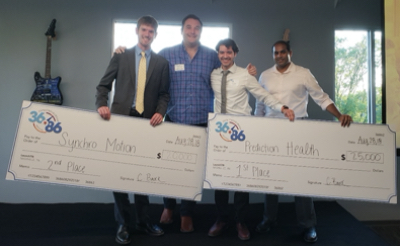By Jenna Somers

Since the inception of the Vanderbilt I-Corps Site Program just three years ago, more than 20 teams of VU innovators have been accepted into the National Science Foundation’s prestigious National I-Corps Program, turning their STEM ideas and research into novel inventions that improve health care, strengthen cybersecurity, produce clean energy, support people battling drug abuse and mental health disorders and more.
The Wond’ry and the Vanderbilt Institute for Surgery and Engineering, guided by the mission of the Office of the Vice Provost for Research, collaborated with the NSF to create the Vanderbilt I-Corps Site Program in 2017.
Synchro Motion and PredictionHealth are two of the dynamic startups to emerge from the Wond’ry’s entrepreneurship programs, where the teams received micro-grant funding, and the NSF’s National I-Corps experience, from which they received an additional $50,000. Since completing I-Corps, these companies have continued to grow and reflect the spirit of innovation at Vanderbilt.
Synchro Motion
In 2018, as part of his doctoral work, Harrison Bartlett developed a semi-powered prosthetic ankle working with Michael Goldfarb, H. Fort Flowers Professor of Mechanical Engineering, and Brian Lawson, a mechanical engineering postdoctoral fellow. After realizing their prosthesis could address needs in the market, the trio formed the company Synchro Motion and continue to refine the design of their technology.
Synchro Motion became the first Vanderbilt team to complete the National I-Corps program after the university’s designation as an I-Corps site. Since then they also have built a prosthetic knee, with other proprietary technology in the works. The National Institutes of Health and the NSF have recognized the ingenuity of Synchro Motion’s technology, with the NIH granting phase one and two Small Business Innovation Research awards to support the prosthetic ankle design, and the NSF granting a phase one award for the prosthetic knee. Additionally, the company won second place at the 2018 Launch Tennessee 36|86 Student Edition Pitch Competition.
“Our goal at Synchro Motion is to design practical, creative, cutting-edge technology that restores able-bodied function to people living with mobility problems—not just amputees, but people who have had strokes, spinal cord injuries and other physical impairments,” Bartlett said.
Two years after Synchro Motion’s I-Corps experience, Bartlett said the value of customer discovery remains the most important lesson he has learned from the program.
“Talking to people reframes your approach to product development,” he said. “For instance, talking to insurance providers informed how we modified the design of the prosthetic ankle because there are a lot of features that insurance companies won’t reimburse. No one will want to buy your product if insurance isn’t going to cover it.”
By trusting the customer discovery process, Synchro Motion has augmented the practicality of the prosthetic ankle. As featured on NSF’s “4 Awesome Discoveries You Probably Didn’t Hear About,” the ankle is now built to withstand a lifetime of fatigue and has several safety features to help prevent falls. “In the lab, it doesn’t make sense to create something waterproof as a proof of concept,” Bartlett said, “but when you talk about something that’s going to be on someone every day of their life, they should be able to walk out in the rain.”
Bartlett appreciates Vanderbilt’s commitment to entrepreneurship and the support that the Wond’ry provided him. “It really supplemented my doctoral education,” he said, “and I share heartfelt thanks for that.”
PredictionHealth
Pedro Teixeira, MD/PhD’19, and Ravi Atreya, MD/PhD’20, established PredictionHealth in 2017 to reduce the hours that doctors spend documenting electronic health records. With the click of a button, doctors can record patient visits and receive high-quality clinical notes without the hassle of dictating or typing the notes themselves. PredictionHealth’s service combines artificial intelligence with remote scribes to convert recordings from each patient visit into the summarized clinical note, allowing doctors to focus more on listening to, and caring for, patients, which greatly improves the health care experience.
In 2018 PredictionHealth won first place at the Launch Tennessee 36|86 Student Edition Pitch Competitionbefore advancing through the National I-Corps program at the beginning of 2019. Since then PredictionHealth has expanded service to 10 sites and is now in the process of extending support to clinical administrators by providing real-time metrics to assist in streamlining organizational processes and documenting information that may otherwise slip through the cracks.
As telehealth appointments increase during the COVID-19 pandemic, PredictionHealth provides additional value to doctors. By recording meetings and producing notes, the company ensures one less disruption in the distraction-prone setting of a video call, and doctors do not have to minimize video screens to make room for typing notes.
“The biggest value of the Wond’ry’s program and the NSF’s national program was in going through the rigorous and scientific approach to customer discovery interviews,” said Atreya, co-founder and chief technology officer of PredictionHealth. “We continue those to this day—talking to customers, identifying market segments in the context of a larger business plan, and applying the scientific method to track feedback.”
“I-Corps taught us that potential customers really wanted notes at the click of a button, so we focused on delivering that experience and hope to add more as the technology and service matures,” said Teixeira, PredictionHealth co-founder and chief executive officer.
Atreya and Teixeira also expressed gratitude for the support of Associate Professor of Biomedical Informatics Trent Rosenbloom, their team’s PI, and Debbie Gregory, their business mentor, whose dedication enabled the successful launch of their company.